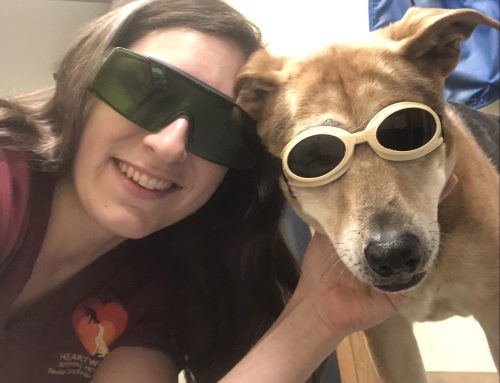James Murray
The heat has been ramping up in Youngsville, and in these first few weeks of Summer our pets may start showing the effects of increased temperature on their daily activity. Dogs are more prone to heat stroke than humans, as their only way of dissipating heat is through panting. The only sweat glands that dogs have are on their paws and unfortunately this is not a major source of cooling. It is commonly reported that areas in direct sunlight at temperatures as low as 70 degrees Fahrenheit, can cause your pet to overheat. The inside of a car without the air conditioning can reach 140 degrees very quickly during the summer. The most common signs of heat stroke include excessive panting, bright red gums, vomiting, diarrhea, an increased heart rate, and increased salivation that can progress to very dry mucous membranes. The normal temperature of a dog should bet between 100- 103, anything above 103 F is very suspicious for heat stroke. This temperature should be checked rectally every 5-10 minutes (your regular thermometer in the first aid kit can work, I just wouldn’t recommend reusing it in people despite how well you clean it!) if you suspect heat stroke.
The most effective treatment for heat stroke is preventing it from happening in the first place. Try to exercise your pet during the early morning or late evening during these hot months. When you do exercise, make sure your dog has access to fresh drinking water every 30 minutes. If your dog has a black coat such as a Black Labrador or if your dog has a flat face like a pug, they will be more sensitive to the summer heat and extra precautions are needed.
If you do believe your dog is showing signs of heat stroke, the best thing you can do at home is rinse them off with very cool water or place cool wet towels over their body. It is important that you always call your veterinarian, as further treatments may be warranted. Your veterinarian will assess hydration status, as well as complications from heat stroke. These will include low blood pressure, kidney failure, and possible neurologic signs. Typically, IV fluids to help cool the body temperature and restore adequate blood circulation provides an excellent prognosis for a great recovery.
On a different note, thank you to everyone who came out to our Pet Parents University seminar on anxiety this past Wednesday. We look forward to seeing everyone for our next seminar on Dog Bites to be held on Wednesday, July 13, 2016, from 5:30 pm to 6:30 pm
Until next time,
Dr. James Murray






Leave A Comment